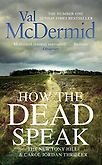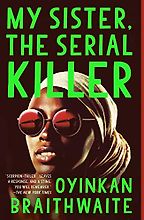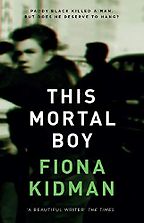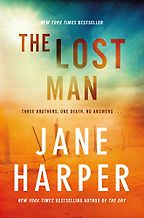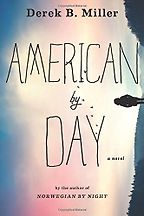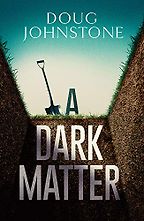We’re here to talk about the best crime fiction of 2019. Has it been a vintage year?
Yes, I think it has. Crime fiction is definitely in the ascendancy at the moment. It became the year when crime fiction outsold every other form of fiction, which is something you can’t complain about. Also, one of the most exciting things in recent years has been the emergence of fiction from different territories. The crime fiction we’ve traditionally been exposed to was mostly from the UK and the US, and, more recently, from Europe. But we’re starting to see a great swathe of writers coming from Ireland, from Australia, from New Zealand, from Asia. It’s exciting to see these cultures developing their own voice in crime fiction.
Absolutely, and that comes through through in the novels you’ve chosen to recommend. Let’s talk about your first book choice, which is My Sister, the Serial Killer by Oyinkan Braithwaite. It was longlisted for the 2019 Booker Prize and shortlisted for the Women’s Prize for Fiction, so it has strong literary credentials. What do you admire about it?
Well, this is a book with such an engaging title that you immediately pick it up and start reading. There’s a striking opening scene where the narrator, Korede, is cleaning a bathroom and complaining in a matter-of-fact tone that the hardest place to scrub clean of blood is where the shower and caulking join… it’s not what you expect from an opening scene!
But the thing I liked about this book most of all was the voice. It’s a first person narrative where you really get a sense of her coming through in the language she uses, the way she speaks, and the way she takes us through her story. There are times when she’s impatient. There are times when she’s forbearing. There are times when she’s frightened. There are times when she’s annoyed with people. You get the whole range of human responses as the book progresses, and you feel very much that you’re seeing the world through a distinct viewpoint.
Get the weekly Five Books newsletter
It’s also a great story. On the face of it, it’s a tense crime thriller: you’ve got Korede’s sister, Ayoola, killing the men she has relationships with – and even by the end, you’re not quite sure what the outcome’s going to be for either sister in the long term. There’s a tension all the way through: are they going to be caught out? Are they going to make it? And, is the next boyfriend going to be killed? So there are all the tense moments you associate with the crime novel: the jeopardy, the fear, the horror.
But underneath that, My Sister, the Serial Killer is a novel of relationships. It’s about family. It’s about the relationships between the two siblings, and between them and their parents. Elements of the back story are hinted at, almost tangentially, as throwaway lines, and we have to colour in the rest. It’s a really interesting novel for those reasons.
Often people who don’t read crime fiction just dismiss it as being formulaic and conventional – crammed between tramlines, just doing the same thing again and again. But then you read a book like this, and you understand what crime fiction can do at its best, the way it can deal with relationships and with wider society.
“Read a book like this, and you understand what crime fiction can do at its best”
In some ways, you’ve got a classic love triangle here: Korede and her sister Ayoola, and Ayoola going off with the man that Korede is in love with. And you have to think: is he going to survive this? But you’ve also got a portrait of life in Nigeria with modern-day Lagos front and centre. Oyinkan Braithwaite, I think, divides her time between London and Lagos, and she gives us a vivid picture of the city – the traffic jams, the corrupt cops, the rain that lashes down and breaks your umbrella. We get a real feeling for what Lagos is really like as a place to live, not least because she writes about it in a very taken-for-granted way.
I’ve often been asked about writing books partly set in the past: how do you write historical fiction? I always say that you only mention things, like the make of car, or the way that something is done, if it’s actually what you would describe in a contemporary novel. Braithwaite does exactly that with the way she writes about Lagos; she writes about it the way that you’d write about London or Los Angeles, with the assumption that the reader understands how city life is. She tells us what we need to know, and then the other stuff just makes sense around that.
This is one of my personal books of the year, too. For all these reasons – and also, because it turns on its head what the reader expects. There’s not the normal sense of quest, of investigation. You know from the beginning who is causing the deaths. And, in a sense, you find yourself rooting for the killer – or at least for the accessory to the crimes.
Yes, she very much plays with our responses as readers, and we are rooting for Korede to make it out the other side, and not to have her heart broken, and not to have to do this all over again. But this is not a novel that gives us easy answers or happy endings. It’s a novel that leaves us with more questions than answers.
One of the other things I was really impressed with is that there’s a sense of coming of age here. It’s a novel, very firmly set in an African country, that doesn’t feel obliged to shoulder that whole weight of the history of the colonial past. It just writes about the way it is here, now. It’s a story that, in a sense, could be set anywhere – and although it is very clear about where it is, and how it’s different from other places, it doesn’t do that retelling of the whole history of the nation, as it were. I understand why so much emerging fiction feels the need to work through that past. And writers like Chimamanda Ngozi Adichie do it remarkably well. But there’s a sense of having arrived at a different place: ‘We don’t need to tell you about that stuff anymore. You should know that stuff by now.’
Let’s move to your second crime fiction recommendation, which has been a huge hit in New Zealand and won a number of major 2019 awards. Might you tell us about This Mortal Boy by Fiona Kidman?
Yes. I want to say a little bit about Fiona Kidman first though, because she’s a remarkable woman. This book is her debut crime novel – she’s 79 – and it won the big Ockham New Zealand Book Award, the New Zealand Booklovers Award, the New Zealand Heritage Book and the Ngaio Marsh Award for the best crime novel.
Kidman is not a newcomer to fiction, though. She caused a scandal in the fifties and sixties, because she wrote novels where women had agency and women enjoyed sex, which was heretical at the time. She’s a very smart woman, and I’m privileged to have spent some time with her when I was in New Zealand recently, because I met her at the Ngaios.
It’s an amazing novel, this. It’s compelling. It’s a novelization of a real event: the second last hanging in New Zealand. It’s a case that Fiona remains convinced was a miscarriage of justice, and that gives her an opportunity to debate the validity of the death penalty. What’s the point of the death penalty? It’s one of these perennial discussions: whether or not we should restore the death penalty.
This Mortal Boy is the real story of a very ordinary young man, Albert Black, who emigrated from Ireland to New Zealand in the 1950s, and was convicted of murdering another young man in a fight at a milk bar in Auckland, when he was only 20 years old. It’s a book about New Zealand’s reaction to outsiders. But it’s a book that tells that story in very human terms.
“At the most, he should have been charged with manslaughter – if anything at all”
At the most, he should have been charged with manslaughter – if anything at all. But Kidman argues very clearly, through her storytelling, that the whole thing should have been declared a mistrial, because of the judge’s instructions to the jury. She writes clearly and lyrically about Black’s collision with New Zealand. There’s a very powerful sense of Albert Black’s being an outsider. He’s come from Protestant Belfast, he’s lost, he’s homesick. He falls in with the wrong crowd. The fight itself – where he killed somebody, allegedly – was pretty much a drunken brawl that got out of hand, and started because they were taunting him for his Irish-ness, his outsider-ness. He didn’t really stand up for himself either in the fight or in the court. He was pretty hapless.
Kidman nevertheless creates a sympathetic picture, without being sentimental, about this young man who sets off to start his new life, where everything that could go wrong went wrong. And she paints a great picture of the conservative 1950s: the Teddy boys and milk bars, the social repression, and the emotional constipation.
At that time in New Zealand, there was a real fear of juvenile delinquency, that immorality was going to sweep the country into the gutter. Kidman uses this one case to shine a light on that unpleasant era in New Zealand’s history. Modern New Zealand is very much about openness and equality, and trying to make everybody welcome, but it certainly wasn’t like that in the fifties.
It’s very moving. Kidman lets the story speak for itself. She doesn’t take an authorial viewpoint telling us what to think. She lays it out very clearly and very coolly for us to make our own judgments. I’m not surprised it’s won so many prizes because it’s really powerfully written, and because of that it’s a powerful advocate for the issue that it’s looking at.
I’m very interested in her decision to novelize a real case. I’m thinking in the context of the recent resurgence in true crime writing. Do you think that the genres of crime fiction and true crime share an audience?
For a very long time there was a separation between readers of true crime and readers of crime fiction. But, increasingly, there seems to be a crossover audience. Some fiction writers have taken to this approach of writing about historic cases in a fictional way – sometimes in quite an emotionally heated way. But Fiona Kidman has stuck to the facts as we know them. And what she has filled in is, I think, valid based on the evidence that was available to her.
As a result of writing this, she’s made contact with Albert Black’s relatives, who are very, very moved by the fact that even at this remove, somebody cares enough about the fate of Albert to address these issues.
So it can be a very powerful tool, but it leaves me a bit queasy sometimes – putting words in the mouths of real people, when we can’t possibly know what actually happened. Sometimes it can, I think, have a very unsettling effect on people who are still around and who were touched by the case, however tangentially.
Yes. It can be uncomfortable when fact and fiction are not clearly delineated.
It doesn’t always sit well with me. But I think this particular book does it beautifully. As it should be done. It’s not full of high flown imaginary scenes. There’s nothing in here that wouldn’t have taken place.
Let’s stay in the Antipodes for your next pick of the best 2019 crime fiction: this is Jane Harper’s The Lost Man. It’s her third thriller set in the Australian bush. I read and loved her hit debut, The Dry – will this new book impress her legions of fans?
Absolutely. It’s interesting: Harper moved to Australia from the UK, and has clearly brought that dispassionate outsider’s eye to the country, and to the landscape, that you can’t always achieve when a place has always been part of your life. Some people write very well about places they’ve lived all their lives, and open the door for us. Other people come to a place and see it afresh and give us a very different view of it. Jane Harper seems to have managed to inhabit both of these things.
There’s a real sense of being on the inside with her books. From my recent trip to the Antipodes, I know that in Australia they think she’s terrific. In fact, they’re just calling her an Australian writer now. They’ve completely left out the fact that she’s from the UK. What she’s really very good at is capturing the atmosphere of landscape and climate, and the pressures that puts on the people who live there.
I think The Lost Man is her best yet. It’s not just a great crime novel, I think it’s a great novel. She writes really movingly and really interestingly about the inimical landscape of Queensland.
You know, I often say about Australia that it’s not designed for human beings. It’s a tough country to live in, because of the climate and because of the extremes – as you’ve probably seen recently with the terrible bushfires raging in New South Wales. At the beginning of this book, a man is being roasted to death under the sun. You’re gripped from the start by this opening, and you have to read on, you have to understand. You have to read on because you need to know who he is, why he’s there, why this is happening to him.
Five Books interviews are expensive to produce. If you're enjoying this interview, please support us by donating a small amount.
If you’ve never been to Australia, you might not know that when we talk about a farm in Australia, we’re not talking about a farm like those in the Yorkshire Dales that covers maybe a few square miles. A farm in Australia is just massive, sometimes thousands of square kilometres. You do your patrolling of your land not on foot but in utility vehicles. Some farmers do their farming by helicopter. The scale is really hard to get your head around. But Jane Harper manages to give us a sense of what that’s like, and what the implications are if you are out in that landscape without the stuff you need: without fuel, without wood, without water. It’s a wonderful evocation of landscape, and also of the way that lives are shaped and distorted by the exigencies of that landscape
As usual with Jane Harper, she’s very good at drawing people’s past into their present. There is a whole complex of historical events underpinning this story. It’s about the darkest of family histories.
It’s a gripping read. She writes really well. She writes dialogue particularly well. You have the sense when you’re reading her dialogue that this is the way people speak to each other: it’s not overworked, it’s not affected. It has all those shorthand ways we use in speaking to each other, and I think there’s a real sense here of a writer who is growing with every book.
Harper’s success seems to have stimulated a boom in Australian crime fiction. Outback noir, I think people are calling it. Do you think it’s a corrective to the frozen wastes we were seeing in Scandi noir?
I think it’s an addition rather than a corrective! What often happens is one novel will break out – with the Scandi noir it was Stieg Larsson that really exploded – and then every publisher has to have a Scandi noir! With Antipodean noir, if you like, Jane Harper’s had such a huge success that people are starting to realise that crime writing in Australia is really good.
Actually, what you usually find is that there, behind the big breakthrough, are a couple of figures in the dim landscape. In Scandi noir, you had Sjöwall and Wahlöö, and Peter Høeg’s Miss Smilla’s Feeling for Snow, which sent a trickle of awareness into the marketplace. Readers thought, ‘Oh, that’s interesting, I quite like that.’ And in the wake of that you get the big blockbuster.
In Australia you had the remarkable, the wonderful Peter Temple, whose novels lit up the 1990s and the early 2000s – the Jack Irish novels and his other award-winning novels. He was an astonishing writer, but he never broke out into wider bestseller-dom, although he won the Gold Dagger for The Broken Shore. That made some of us aware that there was good crime fiction coming out of Australia. Temple was really a class act, and opened the door for a big blockbuster like Jane Harper’s to come powering through. And the great thing about that is then publishers and readers start to become curious about what else is going on in this particular corner of the world. It’s exciting for me as a reader, I think it’s brilliant.
Yes. I love to have a glimpse into another way of life through fiction. Your fourth pick in your selection of the best crime fiction of 2019 is American by Day by Derek B Miller, which is a follow-up to his highly acclaimed debut Norwegian by Night. What did you like about it?
I think it’s a very clever thing to do. With Norwegian by Night, Miller basically transplanted an elderly American into the landscape of Norway, and through that lens was able to look at issues around immigration, issues around policing, issues around the Norwegian way of life through the eyes of somebody who was not part of that society. It’s not an uncomplicated viewpoint, because the main character in Norwegian by Night is suffering from Alzheimer’s. So you’ve got another layer of complexity woven in there.
In the follow-up to it, he sent the Norwegian cop at the heart of Norwegian by Night, Sigrid Ødegård, to upstate New York to find her missing older brother Marcus, who is suspected of having murdered his African-American girlfriend by pushing her to her death. Sigrid teams up with the local sheriff, who is a sort of folksy good guy, a bit of an oddity, with surprisingly hip musical tastes and a master’s degree in divinity. So we have a classic uneasy partnership where each has to learn from the other.
It’s complicated by the fact that Sigrid had shot a hostage-taker back in Norway, and that’s a very rare event in Norway. So American gun culture comes as quite a shock to her, although she learns pretty quickly how it works. Again, it uses the outsider’s point of view to talk about American society and the problems with American society. It deals with police brutality. It deals with race relations. Sigrid is a kind of oddity within that landscape. She reminded me a bit of Frances McDormand’s character in Fargo.
Marge! She’s the best.
Yes, and there’s a bit of her about Sigrid. So we get those odd, quirky, funny bits in between the serious stuff. There are some playful interactions with language as well – the banter between the cops sometimes becomes quite surreal, because Sigrid translates Norwegian sayings literally. One is something like, ‘It’s hard to ignore the moose sitting on your waffle.’ The American cop looks puzzled. She replies, ‘That might just not translate very well.’ So there are these little moments where the darkness is shot through with these cross-cultural miscommunications.
And again, it’s about family, because Sigrid’s relationships with her father and her brother are woven through this novel. This book reminds me of the things that crime fiction can do when it works well. We don’t write about murders that happen in a vacuum. It’s about the intermarriage, the interweaving of crime and people, and the things that matter to them in their lives.
“What we really talk about when we talk about crime fiction isn’t really murder”
What we really talk about when we talk about crime fiction isn’t really murder. We’re talking about politics, we’re talking about race relations, we’re talking about family relationships, we’re talking about love, we’re talking about all sorts of things – driven by the engine of this violent death there in the wings, always, which pushes us forward. But, in many ways, that’s not the most important thing.
American by Day is engagingly written. Miller isn’t afraid to write characters who are opinionated. They don’t hold their tongue about what they believe in, they let rip. People are angry, people are passionate. I love the unorthodoxy of it, I suppose. It’s not what you expect it to be.
Do you think people need to have read the first book to enjoy American by Day?
I don’t think you have to read it, but I think it gives an extra dimension to it because, in a sense, they’re mirror images of each other – looking at each other’s society through the eye of an outsider. And read Norwegian by Night anyway, because it’s a great read. I remember first reading that and thinking, ‘Oh, this guy can really write.’
Okay, that brings us to book five, which zips us right up to the present: A Dark Matter by Doug Johnstone. The ebook came out only days ago, and hard copies are currently available on pre-order. This is very exciting for us, as so many of the books we recommend on Five Books are centuries old. Why do you think it amongst the best crime fiction of 2019?
It’s a really great read. I read this in two days when my life was very busy, and I really shouldn’t have been taking time off to sit in the corner and read, but I just kept wanting to return to it because I was marvellously entertained and engaged by it.
The basic setup is that the Skelf family has a long-established funeral home business, and also a private-eye business. When Jim, the patriarch, dies, it’s left to his wife Dorothy, his daughter Jenny and granddaughter Hannah, to take charge of both businesses.
I think it’s really terrific that the family are called Skelf –a ‘skelf’ in Scots dialect has two meanings: it means a splinter of wood – like when you get a splinter in your finger – but also by extension somebody who’s a pain in the neck, a troublesome person, somebody always causing trouble wherever they go.
“Scots are very good at that dark, black sense of humour”
It starts off with Jim’s death, and very quickly we discover that the image they have of the dead man as a warm, honourable, decent, kind guy, is not quite the whole picture. The big question that runs through the book is just how far from the truth their image of their dead father and husband is. Dorothy discovers there are mysterious payments out of the firm’s bank account to another woman. So was Jim really the doting husband she thought he was?
Hannah’s best friend has vanished from university, and that leads them into all sorts of dark corners. Then Jenny, the middle one, starts looking at what’s supposed to be a simple adultery investigation. Before she knows it, she’s into something much stranger and much darker than any of them could have pictured at the start of it all.
So you’ve got these different intriguing stories interweaving through the book and interlocking. Running through it all like a dark thread is their grief, which keeps intruding in the most uncomfortable and awkward places. They’re struggling with their loss, they’re dealing with these complicated cases, and all the time they’re having to accommodate the things that they’re learning about the family and their past. It’s compelling, it’s shocking, but it’s also very funny in places. It’s very dark. Scots are very good at that dark, black sense of humour, you know?
Definitely.
I think that’s always the thing that distinguishes tartan noir: the interest in the psychology of individuals, but also the ability to make inappropriate jokes at the worst times. We all stand at the graveside cracking jokes because that’s just how you get through.
It’s a big change for Doug Johnstone. He’s always written standalone books before now, always resisted the pull of the series. But he’s already talking about this as a trilogy, and I can’t wait for the next one. I suspect it could easily turn into a much longer running series than that.
It has quite an interesting origin, too. Doug was actually writer in residence in a funeral home for six months.
Really? How fascinating.
He spent six months working with the people in the funeral home, and talking to them and understanding their work and finding out what their jobs actually entail. So he’s put all of that to very good use – there’s an authentic feeling to the setting. It dispels a lot of myths, and certainly I came away from it having learned an awful lot about the business of how we deal with death.
I think one of the other interesting things about Doug is that, on the surface of it, he’s a Scottish bloke – a strong, tough guy, who plays football, likes a pint with the lads, stuff like that – but he writes women brilliantly, with real insight and an unsentimental understanding. That’s one of the standout things in his work, and it’s really clear in this book. Again, it’s a far from happy ending, but it’s a really good read.
To bring our discussion to a close: You personally have sold over 16 million books. You’ve been acclaimed as the ‘queen of crime.’ Your latest novel, How the Dead Speak, is your 33rd. What drew you to crime fiction particularly, and what keeps you there?
I suppose it really started as a story of failure. I was convinced when I left Oxford that I was going to write the great English novel. I tried to write literary fiction, and I clearly was rubbish at it. I mean, that doesn’t surprise me. I started my first proper novel when I was 20, and you think you know everything about the world when you’re 20, but in fact, you know nothing. And so, having failed at writing literary fiction, I thought I would try crime novels, because I read a lot of crime fiction and loved it. It was always my guilty pleasure, if you like. So I thought maybe I could write a crime novel.
The thing that kick-started me from thinking, ‘maybe I could write a crime novel,’ to actually getting down to it, was Sara Paretsky’s first novel, Indemnity Only. I loved that there was a strong female character with a brain, a sense of humour, agency. Also, I loved that it wasn’t just some random village that had had a random murder bolted onto it: the crimes that happened in her novel happened organically. They happened because of the kind of place Chicago is, because of the kind of things that people do there; because of the jobs they do, because of the politics in the city.
I thought: ‘That’s the kind of book I really want to write.’ And so, I started writing what became Report for Murder, and the rest is history. I’ve been lucky that I began writing crime fiction at a time when the genre became much more expansive, much less hide-bound by form. We can be much more experimental now. We can write in all sorts of different tones and styles and still fall within the big tent that has become modern crime fiction.
I genuinely think that, in the way that we go now to Charles Dickens to find out how people really lived in Victorian era, in a hundred years’ time, when people want to find out how we live now, they we will go to the crime novel.
Interview by Cal Flyn, Deputy Editor
December 4, 2019. Updated: August 17, 2024
Five Books aims to keep its book recommendations and interviews up to date. If you are the interviewee and would like to update your choice of books (or even just what you say about them) please email us at [email protected]

